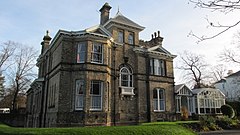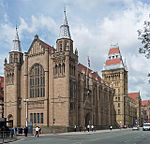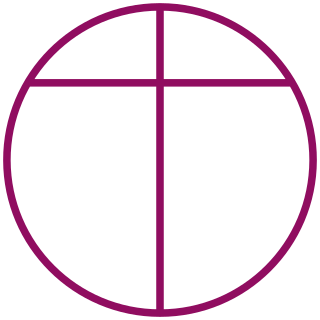
Opus Dei, formally known as the Prelature of the Holy Cross and Opus Dei, is an institution of the Catholic Church which teaches that everyone is called to holiness and that ordinary life is a path to sanctity. The majority of its membership are lay people; the remainder are secular priests under the governance of a prelate elected by specific members and appointed by the Pope. Opus Dei is Latin for "Work of God"; hence the organization is often referred to by members and supporters as the Work.

Saint Josemaría Escrivá de Balaguer y Albás was a Spanish Roman Catholic priest who founded Opus Dei, an organization of laypeople and priests dedicated to the teaching that everyone is called to holiness by God and that ordinary life can result in sanctity. He was canonized during 2002 by Pope John Paul II, who declared Saint Josemaría should be "counted among the great witnesses of Christianity."
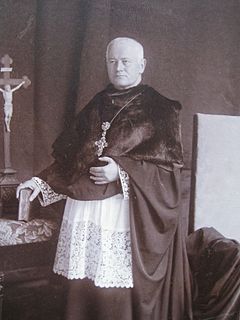
A prelate is a high-ranking member of the clergy who is an ordinary or who ranks in precedence with ordinaries. The word derives from the Latin prælatus, the past participle of præferre, which means 'carry before', 'be set above or over' or 'prefer'; hence, a prelate is one set over others.

Personal prelature is a canonical structure of the Catholic Church which comprises a prelate, clergy and laity who undertake specific pastoral activities. The first personal prelature is Opus Dei. Personal prelatures, similar to dioceses and military ordinariates, are under the governance of the Vatican's Congregation for Bishops. These three types of ecclesiastical structures are composed of lay people served by their own secular clergy and prelate. Unlike dioceses which cover territories, personal prelatures—like military ordinariates—take charge of persons as regards some objectives regardless of where they live.
Movements in the Catholic Church are groups of church members following a specific spirituality given to them by their founder. In the case of officially recognized movements, this specificity is in harmony with teachings of the Magisterium while emphasizing a specific way of Christian life.

Javier Echevarría Rodríguez was a Spanish bishop of the Roman Catholic Church. Until his death, he was the head of the Prelature of the Holy Cross and Opus Dei. He held doctorates in both civil and canon law.
Opus Dei and politics is a discussion on Opus Dei's view on politics, its role in politics and its members involvement in politics. There were accusations that the Catholic personal prelature of Opus Dei has had links with far-right governments worldwide, including Franco's and Hitler's regimes. Recent studies meanwhile have done much to counter these claims, especially the work of John L. Allen, Jr. who spent a year studying the organization. He says that Josemaría Escrivá was staunchly nonpolitical, and that Opus Dei's cardinal principle is that "it can never take political positions corporately. It would compromise the notion of secularity—that political thinking is something for lay people to do, not for a church organization to do. Therefore, on questions that don't deal with faith and morals, there's great pluralism."
Opus Dei: A Historical Timeline shows the historical development of Opus Dei.
Opus Dei and Catholic Church Leaders discusses the comments and observations of Popes, Cardinals and other leaders of the Catholic Church as regards the Personal Prelature of the Holy Cross and Opus Dei.
This is a bibliography of works about Opus Dei, also known as the Prelature of the Holy Cross and Opus Dei, which was founded by Josemaría Escrivá.
Opus Dei in society refers to the social mission, general social strategy, social activities, work, relationship with politics and other aspects of Opus Dei.

The Priestly Society of the Holy Cross is an association of Catholic diocesan priests which is integrally united to the Prelature of Opus Dei.
Opus Dei is a personal prelature within the Roman Catholic Church that has been the subject of numerous controversies.
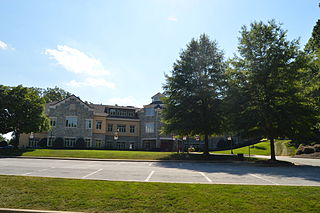
The Heights School is a preparatory school for boys in grades 3-12 in Potomac, Maryland. Its mission is to assist parents in the intellectual, spiritual, and physical education of their sons. It is located in the Roman Catholic Archdiocese of Washington but is no longer officially recognized by the archdiocese as a Catholic school. The school's Christian orientation and spiritual formation are entrusted to Opus Dei, a personal prelature of the Catholic Church founded in 1928. The Heights School offers a liberal arts curriculum in English, mathematics, classics, history, religion, science, Spanish, art, computers, music.
Creston College is an Opus Dei residential college associated with the University of New South Wales. Founded in 1970, Creston College is a project of Foundation for Education and Training (FFET), which aims to promote education and the development of character in accordance with the principles and ideals of Christianity.
William H. Stetson was a Roman Catholic priest of the Prelature of Opus Dei ordained in 1962. He was an honorary prelate of the Pope with the title of Reverend Monsignor. He lived in Los Angeles, California.

The Catholic organisation Opus Dei is made up of several different types of membership:
Northridge Preparatory School, or Northridge Prep, or NRP is an independent college preparatory school for young men, located in Niles, Illinois. The school offers a recognized curriculum and a strong athletics program.

Fernando Ocáriz Braña is a Roman Catholic priest who serves as the current Prelate of Opus Dei. Monsignor Ocáriz is the fourth person to head Opus Dei since its founding in 1928. He is widely published in philosophy and has been a consultor of the Congregation for the Doctrine of the Faith since 1986.
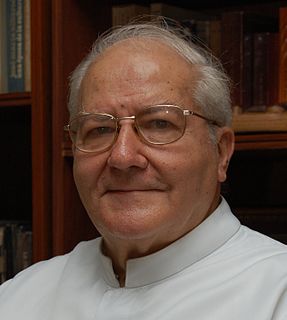
Louis Joachim Munoz, MFR was a Spanish priest. He lived in Nigeria for 47 years where, alongside his duties as an Opus Dei priest, he lectured on political science and French.
